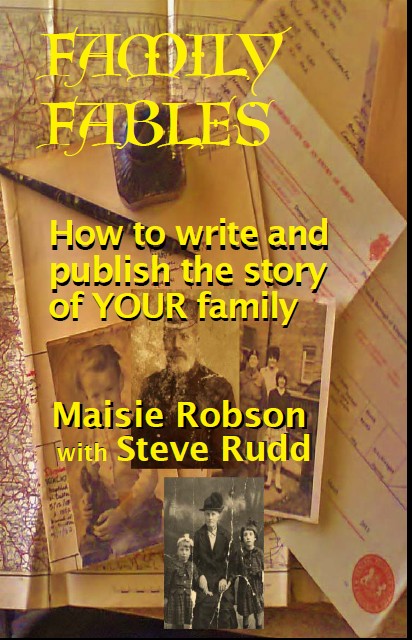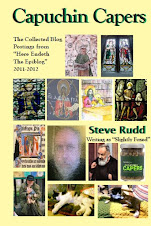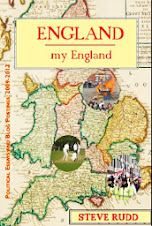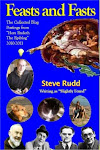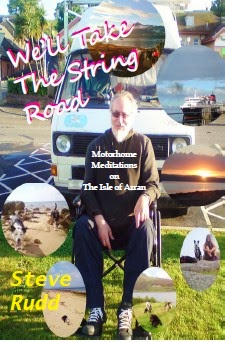It has been a busy week in the Holme Valley. Sadly, it also turned out to be the week when
several unhealthy chickens also came home to roost. The animals have been fine, even the metaphorical chickens,
but the humans were tried, and found wanting.
Deb was already feeling grim at the end of her teaching week, and it
developed from a sore throat into a cold into
raging flu that put her in bed for the best part of three days straight,
then no sooner was she up and about again (though not fully recovered by a long
chalk) than I started with the same dreary, depressing cycle.
As I type this, I am sitting in my wheelchair, surrounded by
Lem-Sip, Strepsils, Paracetemol, and Buttercup Syrup. I’ve also ingested, over
the last few days, considerable quantities of cider vinegar, orange juice, and
slices of lemon, usually brewed up in a big mug with scalding hot water and
lots of brown sugar.
So, yes, I have had man-flu, and I am still viewing the
world through the hazy soft-focus of its after-effects. One of the worst things about being ill is
that it is very boring. You want to get on with all the multifarious tasks that
are breeding unchecked everywhere you look, but in the end all you are capable
of doing is reading the back of the packets the various remedies are sold in,
and noting how many of them are made by Reckitts in Hull. Meanwhile, May, my favourite month in
the whole year is running through my fingers like sand. Needless to say, our planned trip to The Lakes
got cancelled. The dogs were bored, and Matilda looked concerned that her source of food on demand may have been in peril, albeit temporarily.
So, I’ve not been firing on all cylinders this week, not by
a long chalk. Like Glenn Miller, I am still missing. Consequently, I haven’t been paying attention
to the world at large, not that it deserves much attention, anyway. David
Cameron has been trekking round Europe, feebly grasping at any vague hope that someone
somewhere might let the UK somehow amend the terms of EU membership in time to
save his skin and stave off the thumping NO vote in the 2017 referendum on
whether or not Great Britain should remain a member.
Meanwhile, on the other side of the House, the various candidates for the Labour leadership have been jockeying to show how they, and they alone, will be able to save both the party and the downtrodden working class – in Andy Burnham’s case, reckless Marxist firebrand that he is, he’s against the Mansion Tax and for the Benefits Cap and I cannot help but think either he is a very stupid man indeed or he has got the string bag inside out, or both.
Meanwhile, on the other side of the House, the various candidates for the Labour leadership have been jockeying to show how they, and they alone, will be able to save both the party and the downtrodden working class – in Andy Burnham’s case, reckless Marxist firebrand that he is, he’s against the Mansion Tax and for the Benefits Cap and I cannot help but think either he is a very stupid man indeed or he has got the string bag inside out, or both.
In any event, there is every chance that my membership of
the Labour Party will be very very short at this rate. I am not going to vote
for, and prop up, a bunch of closet Tories.
The sad news for all of us is that we are stuck with government (if you
can call it that) by the Blight Brigade either forever, or until Labour finds a
leader with some principles and the balls to enunciate them. So, probably
forever, then. The Labour Party needs to
present a bold alternative, a visionary choice: if it is just the Tories in
slightly cheaper suits, it is dead.
One thing I did end up watching was the Cup Final, although
to be honest I cared little whether Arsenal or Aston Villa won in the end.
There is so much wrong with football that I could fill an entire Epiblog just
in enumerating the many faults and failings which beset “the beautiful game”.
Here we had two teams, for instance, who had absolutely no geographical
connection to the areas they purport to represent. The days when the town’s
football team was made up of men who, when they were all young urchins, used to
kick a tin can around in the same back streets, with goalposts for jumpers, are
long gone.
Then there is the issue of “support”. Both HRH Prince
William and David Cameron, apparently, “support” Aston Villa. I would like to
tell them that you can only claim to “support” a team when you have stood on a
draughty concrete terrace for ninety minutes feeling the sting of sleet showers
against your face while you watch the said team draw nil-nil with Preston North
End, punctuated only by queuing up for a meat pie from the van on the touchline
at half-time, and trying to eat it straight from the foil without the gravy
going down your wrist. If someone with a
smart phone, a clipboard and an earpiece has “advised” you what team you
“support” and you only ever turn up there for the prawn sandwiches, that is not
“support” in any sense I recognise.
One aspect of the Cup Final that did impress me, though, was
Abide With Me. In recent years the FA
has tended to sideline this, and there have been some bizarrely awful
renditions. However, for this year, some bright spark, and for once I am not
being sarcastic here, had the idea of bringing together a choir of supporters
from every club that qualified and made it as far as the third round to sing
the hymn, under the leadership of one Alfie Boe, whom I must admit I had not
previously been aware of, but somehow, whether it was the “ad hoc” nature of
the performance, with the real enthusiasm of the fans showing through, or
whether it was my generally feeble and maudlin frame of mind, with my head full
of Buttercups and Paracetemol, I don’t know, but it really affected me.
It reminded me of what football was really about. You
started playing football at school, maybe, in the playground, with the goal
painted on a brick wall, or on the school field with – yes, it’s a cliché, but
it’s true – jumpers for goalposts. You maybe had kickabouts in the park with
your mates, and you resolved the problem of odd numbers of people wanting to
play by one team playing “goalie stick” and one team playing “goalie ness”.
When you were old enough, your dad, or your mate’s dad, or
uncle Ken took you to watch your local team, and you stood on the terraces and
shouted yourself hoarse, part of the tribal music as the crowd swayed and
chanted around you. And your hands were numb with cold at half time, when you
queued up to buy a hot dog and a plastic cup of Bovril from the touchline stand
and your breath streamed away in a cloud of steam as you tried to eat the food
and drink the drink without taking out the back of your throat.
There was always one old gadger there, with a flat cap and a
scarf, who didn’t say much, but when he did talk, he talked about the old days,
the glory days, when men wore long baggy shorts and the ball was as solid as
once of Nelson’s cannonballs. Sometimes, he’d even tell you how football once
stopped a war, and his dad played in a match against the Jerries in No-Man’s
Land, at Christmas. Then, on the bus back home, you’d re-live the match, and
act it out for real at school on the Monday.
Eventually, when you got married and had kids of your own,
you taught them to kick a ball about in the garden when they were old enough to
toddle, and played “three and you’re in” with one of those little pop-up
tubular goals you can get from B & Q.
And then one day you took your own kid to his first match.
And you weren’t the only ones. Families all over England
were going through this cycle, were part of this tradition, growing up to love
the game. Every generation, in succession, had the old gadgers who said it was
never as good as before the war, the Uncle Kens who reeked of Brycreem, and the
eager, snotty kids who could be found kicking a raggy old ball round the
cobbled backstreets by lamplight. They pretended to be their own favourite
players, the ones whose blurry pictures they collected from their weekly comics
and stuck into albums.
Anyway, the moment passed, and Arsenal won, 4-0, in case you
were interested.
The cup final was a welcome distraction from two other
stories this week which, had I not been so ill, would have made me extremely
angry. They still raised anger in me in
my present state, but it was more the sort of “Oh for God’s sake” despairing
anger than the “I am going to do something about this” anger. The first was the Daily Mail story about how Kos is being “ruined” as a holiday resort for British
holidaymakers because of the presence of refugees and boat people trying to
make their way to any EU country where they can claim asylum. The irony that these resorts were previously
“ruined” by gangs of drunken British tourists, who did far worse than dry their
dirty washing on the promenade (something the Mail found particularly
objectionable) was lost on most of the online commentators. One of these, taken to task, replied that the
drunken Brits could always go home again afterwards, which is very true. Sadly,
that option isn’t open to people whose miserable breeze block huts have been
bombed by the USAF, or the RAF, or have been taken over and infested by ISIS,
or all three. The dirty washing that is
being hung out in Kos is the dirty washing of
all of us, and this is only the pre-wash. There’ll be a lot more dirty washing
in the Ali Baba basket before this gets sorted out.
But of course, if and when the UK does vote to leave the EU, or even if we don’t and Cameron gets his way on bombing the refugee boats at anchor, and if we do succeed in repealing the Human Rights Act, then Katie Hopkins and Britain First and UKIP and all the rest of them can all line up on the White Cliffs of Dover and have a party, while they listen to the drowning cries of refugee children. We will have become even more of a quasi-Fascist, xenophobic hellhole. But at least the freedoms our forefathers fought for in 1940 will have been saved. Or something.
But of course, if and when the UK does vote to leave the EU, or even if we don’t and Cameron gets his way on bombing the refugee boats at anchor, and if we do succeed in repealing the Human Rights Act, then Katie Hopkins and Britain First and UKIP and all the rest of them can all line up on the White Cliffs of Dover and have a party, while they listen to the drowning cries of refugee children. We will have become even more of a quasi-Fascist, xenophobic hellhole. But at least the freedoms our forefathers fought for in 1940 will have been saved. Or something.
Of course, you don’t have to be a destitute Afghan or Syrian
to feel the wrath of officialdom in Britain today – even somewhere as prosaic
as Hackney is doing its bit in turning Britain into one gigantic Victorian
workhouse, by instituting something called a “Public Space Protection Order”
which allows them to fine homeless people sleeping in doorways £100.00, which
can become £1000 in court, for effectively the “crime” of being a nuisance and
not having a home to go to. Needless to
say, this development has been blasted by homelessness charities:
Matt Downie, director of policy and external affairs at
Crisis, said: "Rough sleepers deserve better than to be treated as a
nuisance – they may have suffered a relationship breakdown, a bereavement or
domestic abuse. "Instead, people
need long-term, dedicated support to move away from the streets for good.”
While Mark McPherson of Homeless Link added: “Those who
sleep on the streets are extremely vulnerable and often do not know where to
turn for help. These individuals need additional support to leave
homelessness behind, and any move to criminalise sleeping rough could simply
create additional problems to be overcome."
This measure is being particularly targeted at “tourist
friendly” parts of Hackney, such as the Broadway Market and the Regent’s
Canal. No doubt the Council would prefer
it if the homeless just cut out the middleman and jumped in the
tourist-friendly Regent’s Canal, thus saving them a lot of paperwork. This sort of behaviour, of course, is typical
of London Tory councils, like Westminster,
where the wealthy don’t like to look out of their windows and see poor people
being given soup, because it pricks at the fragmentary remains of their
consciences, but hey, guess what, Hackney is a Labour Council. I must find out
if there is a way of instigating a motion of censure on Hackney Council at the
Labour Party conference.
One of the other activities prohibited by Hackney’s PSPOs is
“taking drugs in a public toilet” – it’s a pity that the Houses of parliament
aren’t in Hackney. Anyway, as part of a
Labour Party that seems to believe every bit as much in grinding the faces of
the poor as the Tories do, Hackney Council will probably get headhunted by
Cameron to sort out the mess in Kos.
So, today we have come to Trinity Sunday, and I have to say
that on this red-letter day in the calendar of the Church, I feel even less
spiritual, even less enlightened, than I did last Sunday. I have, in the past,
spent a considerable amount of time and effort trying to understand and explain
the ideas of the Pentecost and the Trinity, but this year the whole thing has
passed me by. Partly because I’ve been so busy working, partly because I’ve
been ill, and partly because I think I have once more begun the process of
losing my faith, such as it was. My only
spiritual connection with the Trinity is that it’s lent its dedication to Holy
Trinity, the unacknowledged cathedral of Hull.
It becomes harder and harder to cling to the idea that there
is some purpose and meaning to things, even though it may not be vouchsafed to
us, in a world where the answer to refugees is apparently to bomb them, a world
where the answer to the homeless is to put them in jail. Not to mention the election result and the
relegation of Hull
City.
Joking apart, though, the more I look at life these days the more it does seem to be random, pointless and cruel, although there are still moments – when I look at the flowers on the clematis in the garden for instance, trying to fix them in my mind so that I can remember them, come November, when everything is black and dead again – there are still moments when I feel a connection to – something. But as to the complex theology of the Trinity and Jesus telling his disciples to go and baptise everybody, and Pentecostal fire and speaking in tongues, it is all starting to look a bit… dare I say, irrelevant? I know that Jesus, if he here were today, would be in the boats with the migrants, but that doesn’t stop one single child from being drowned.
Joking apart, though, the more I look at life these days the more it does seem to be random, pointless and cruel, although there are still moments – when I look at the flowers on the clematis in the garden for instance, trying to fix them in my mind so that I can remember them, come November, when everything is black and dead again – there are still moments when I feel a connection to – something. But as to the complex theology of the Trinity and Jesus telling his disciples to go and baptise everybody, and Pentecostal fire and speaking in tongues, it is all starting to look a bit… dare I say, irrelevant? I know that Jesus, if he here were today, would be in the boats with the migrants, but that doesn’t stop one single child from being drowned.
The best lack all
conviction while the worst
Are full of passionate
intensity
As Yeats put it in The
Second Coming.
As well as Matthew 28: 16-20, which is the bit where Jesus
tells the disciples to go and teach all nations, the other reading for today is
Romans 8: 14-17
For
as many as are led by the Spirit of God, they are the sons of God. For
ye have not received the spirit of bondage again to fear; but ye have received
the Spirit of adoption, whereby we cry, Abba, Father.
An appropriate cry in a week which also contained the
Eurovision Song Contest.
So I find myself almost in the position of becoming one of
those people who say “if there is a God then why does he allow…” and going on
to list a whole litany of ills and injustices.
The answer is I don’t know, as I have previously said. No idea.
Absolutely not a Scooby.
I have been here before, like T S Eliot in Little Gidding:
If you came this way,
Taking the route you would be likely to take
From the place you would be likely to come from,
If you came this way in may time, you would find the hedges
White again, in May, with voluptuary sweetness.
It would be the same at the end of the journey,
If you came at night like a broken king,
If you came by day not knowing what you came for,
It would be the same, when you leave the rough road
And turn behind the pig-sty to the dull facade
And the tombstone. And what you thought you came for
Is only a shell, a husk of meaning
From which the purpose breaks only when it is fulfilled
If at all. Either you had no purpose
Or the purpose is beyond the end you figured
And is altered in fulfilment
Taking the route you would be likely to take
From the place you would be likely to come from,
If you came this way in may time, you would find the hedges
White again, in May, with voluptuary sweetness.
It would be the same at the end of the journey,
If you came at night like a broken king,
If you came by day not knowing what you came for,
It would be the same, when you leave the rough road
And turn behind the pig-sty to the dull facade
And the tombstone. And what you thought you came for
Is only a shell, a husk of meaning
From which the purpose breaks only when it is fulfilled
If at all. Either you had no purpose
Or the purpose is beyond the end you figured
And is altered in fulfilment
I hope I feel better, physically and spiritually, next week.
What I think I need at the moment is some sort of spiritual Lem-Sip. Something
to dull the pain and make me see things more clearly. Sadly, I don’t think you can get it from
Sainsburys.
Anyway, it’s Sunday teatime and all I have done all day is doze
off and write this blog. I must get well and get on. People are depending on
me. But I think that’s it for today, at least for what passes for intellectual
effort. I don’t really know why I am writing a spiritual blog at all these days
when the only spiritual experiences I have are largely incommunicable. At the
moment it feels like that low point after a major defeat when the confused
survivors have fled the field where you have to just trust that somehow,
tomorrow is another day and everything will sort itself out somehow. The Platonist in me tells me that there is
something good in everything I see, which is, I suppose, all that Julian of
Norwich was saying as well. Perhaps it’s time to call in Abba after all.
.





